#environment analysis
Explore tagged Tumblr posts
Text
In this particular Lies screenshot it does look like his stripes got transferred from his shirt to the cabinet 😂 However, they have always matched (although with opposite orders)!
From the wiki gallery: Simon Says, The Collector, Syren, Oni-chan, Felix





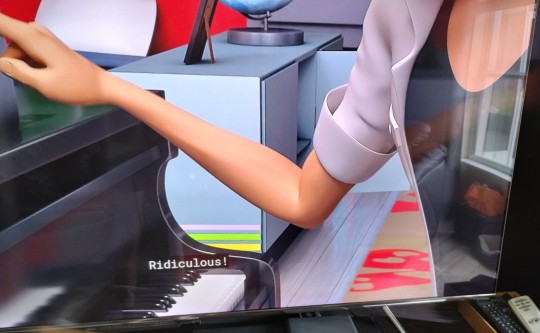
Sorry about the reflection on the screen but everybody please look at this animation glitch in Lies where the stripes on Adrien's shirt disappeared and ended up on the cabinet in the background
#miraculous ladybug#ml simon says#ml jackady#ml collector#ml syren#ml oni-chan#ml felix#ml lies#environment analysis#...I guess? lol#screenshots#I still go nuts over Felix snooping through one of Adrien's cheese stashes djfkskfks#like why did he do that besides trying to find dirt on Adrien and indirectly upsetting Plagg LOL
5K notes
·
View notes
Text
you know i used to think it was weird how sora and roxas have such different personalities for supposedly being 'the same person' but after playing a few games i sort of realized that they do have similar personalities, because roxas acts how sora does when he's under extreme stress.
compare roxas to sora in, say, kh1. that's where a lot of peoples idea of sora's personality comes from. sora is generally very upbeat and optimistic in that game. not very similar to roxas, right?
but let's switch the game and talk about a game where sora is ABSOLUTELY GOING THROUGH IT. chain of memories.
sora's resting state is melancholy in com. he only ever cheers up in short bursts, usually when he's joking around with friends. just like roxas.
he's quick to anger, and tends to lash out at the organization members. best example of this is when larxene makes him 'remember' namine, and he swings at her repeatedly, even after she's gone. he only stops when jiminy is able to snap him out of it.
you know what scene that resembles?
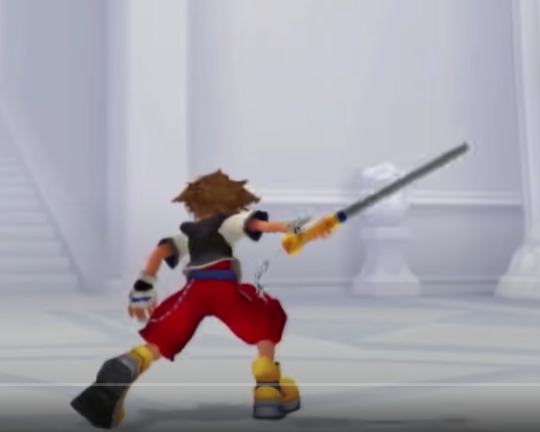

sora, while a bit more on the angry side and less sad, continues to act like this in kh2 when he's in stressful situations. (he also has a tendancy to insult people which, while it's not very related to the point, is very funny and sora saying 'gonna cry?' to xigbar is great.) i cant comment any further than that about kh2 off the top of my head.
so, roxas acts like sora does when he's stressed, right? but why is roxas always acting like that? to which i say, he isnt!
he only ever acts like that when he's also in fucked up and stressful situations, which happens to be a CONSTANT in his life. but when he's hanging out with axel and xion, a decidedly NOT stressful situation, he's a lot more like sora. he's teasing his friends and insulting his coworkers and joking around and acting like a normal kid. not really important, but unless i misremembered some sora lines which is VERY possible, both roxas and sora respond to friendly insults with "oh thanks!" a lot. just a funny little detail that felt relevant.
the biggest differences between roxas and sora boil down to environment and... i dont know how to put it besides volume? roxas is very quiet and tends to keep most of his thoughts to himself, while sora is very loud and expressive in comparison.
there is one other huge difference i noticed, which is less character based and more story. sora wanted to get off destiny islands and explore with his friends, but roxas just wanted routine. sora wants adventure, and roxas wants things to stay the same, for days where he gets off work and eats ice cream with his friends to last forever, to keep having conversations about nothing and watching the sunset. roxas wants normalcy, sora wants excitement. it's just interesting seeing their contrast.
not sure if this is very well said or anything i just wanted to talk about my boys
#random thoughts#its been a while since i got to use that tag eheheh#i bet theres a few people following me who didnt even know i did analysis posts#the fact that sora and roxas grew up in very different environments is pretty important btw#roxas was already a bit quiet and being in a cult where any expression of emotion is immediately shut down probably didnt help#we'll probably never get a good idea of how roxas would be if he was in a normal situation#id say some of the twilight town stuff might be a close estimate but even that doesnt really fit considering all the shit going down#even from the very start hes being accused of theft hes Not doing the best#anyways. sora and roxas are different obviously#but theyre a lot more similar than people really talk about#kingdom hearts#roxas#sora#not rereading this so it might be a little weird and hard to read sorry
2K notes
·
View notes
Text
I have a theory about Tails
When he shows up, he doesn't tell Sonic his real name (Miles) immediately, he just tells Sonic that everyone calls him Tails.

Later, he revealed that other foxes in his village neglected him because of his two tails, and he says "everyone in my village", which means his own family too.


I mean, he literally left his home and never looked back, he clearly wasn't happy there. So if they were the previously mentioned "everyone" who called him Tails, it could mean that this nickname was used to make fun of him. They called him that to offend him. Like kids in schools when they mock somebody and call them names. But why would he tell Sonic that nickname if it's offensive and brings back bad memories? Well, probably because he clearly loves his two tails. He's using them to fly and other foxes probably couldn't do that with only one tail. And he doesn't want to pretend that he's the same as others, but instead he travels to Earth to find Sonic who is different from everyone else but he is loved for his differences.

So I think that he told Sonic about his nickname because he wants to hear it from his hero, from someone he wants to impress. He's hoping that Sonic will use that nickname in affectionate way, because he will appreciate his tails, he will appreciate his abilities and won't make fun of him. He loves that he has two tails and he's hoping that someone else will too. He likes the nickname, but what he doesn't like is that it was used to mock him. Now he finally has a whole family who calls him that and loves him for who he is. Having two tails is no longer a bad thing. Being called Tails is no longer a bad thing.
And THIS. This was already one of the most adorable things ever but now when I think about a deeper meaning behind this...

How he covers Sonic with his tails not just to make him warm but also because he finally has someone who doesn't think that those two tails are weird. He's using his tails to keep his friend warm, a friend who isn't disgusted by them.
And he's rushing into hugs which is probably because he was neglected. Especially the first time when he hugs Sonic after Sonic tells him they're friends now and Tails is so happy to finally have a friend. He was touch starved, he was never loved like he is now.


And he got so emotional when Sonic and Knuckles were arguing because he hates the idea of his new family falling apart now that he's finally happy.


I really hope he gets more screen time in Sonic 4, I love this little fox.
#it just makes me sad to think that he really loves who he is but others did not#this is a proof that sometimes it's not you it's the environment#I've been there#i kinda wish he got more screen time in sonic 3#tails#miles tails prower#tails the fox#sonic movie 3#sonic movie 2#sonic the hedgehog#sonic the hedgehog 2#sonic the hedgehog 3#sonic movie#sonic 2#sonic 3#sonic#sth#scu#sonic cinematic universe#character analysis#gifs#my gifs#sonic movie universe
138 notes
·
View notes
Text
My head canon about Giyuu is that I think he is a really independent younger child, rather than someone who is just spoiled and unable to do basic tasks.
I could just be projecting, because I'm a younger sibling myself and I don't rely heavily on my older sibs, but I think, that even if Giyuu was pampered, he would eventually learn to help Tsutako in the household. There's only two of them and he probably feels bad that his sister had to raise him alone, so I think, that at a young age, he'd do all that he could to lessen some of her burden.
Another reason is that Urokodaki is very strict with his students. I can't imagine that he (and possibly Sabito) would be lenient with his training. Being a Demon Slayer and especially a Hashira, would mean that you need to at least have basic survival skills. Giyuu would eventually need to learn all that. Not to mention Giyuu is a solitary person, so he has to at least be self sufficient if he was able to survive that long.
Since we're at it, that's also why I personally don't think that Giyuu can't swim. As far as I know, there's no strong evidence to support that. Imagine if he has to save someone from drowning during his mission, then he's screwed.
Urokodaki literally throws his students into into the water, so if anything, I actually hc that Giyuu in present, is a very good swimmer, and likely a decent cook too. It's not quite the same, but some of the things he does in the Gakuen spin off seem to suggest it.



Last image is from GS_Karol99 on twit
We see here how he lives alone. His space even looks neat. He prepares his own meals and even trained the kids on how to survive the ocean. (implying he can swim)

I mean yeah ofc, he still has moments where he wants his sister to dote on him, (this is an au were all things went well after all ) but he's also quick to think about not bothering her. Even if this setting has very low stakes, he still wouldn't survive on his own if he wasn't at least independent.
It's just a headcanon of course, but I like the idea of Giyuu being independent, especially his taisho era counterpart. I think it could play nicely in his development by learning that there is no need for shame and guilt in being protected, and that it's okay to rely on others too, even if he still has a way to go with that.
#my post#demon slayer#kny#kimetsu no yaiba#giyuu tomioka#tomioka giyuu#meta#analysis#I guess#thats just my personal interpretation of course#given (what little) info we got w his sister and his environment while training under urokodaki
99 notes
·
View notes
Text
can i just say: i've come to terms w/ the fact that the hxh succession war fandom on tumblr is teeny-tiny in comparison to other shonen.... and i'm actually super super okay with it because basically everyone here is so damn cool. we may be few but we are mighty etc. i've had more positive interactions w/ fellow readers in the past few weeks than i've had in literal years of being in other fandoms. y'all are awesome and the engagement is top tier.
and to literally everyone else who is posting succession war stuff, no matter how obscure, know that i love you and you are soosososooo appreciated! makes me smile every time
#its like here on tumblr i can get the in-depth analysis and crazy theories typical of a reddit post... but w/o any of the toxicity!#same goes for ppl posting funny memes and 1am thoughts and such. i'm glad i'm not on twitter cuz i am being fed veryyy well rn#cultivating a good environment is actually sosososoo necessary for engagement and i've really been feeling the buzz these past few weeks#screeds#txt#hxh#hunter x hunter#succession war arc#hxh succession war#hxh manga#hxh fandom#fandom appreciation
108 notes
·
View notes
Text
"The Scum Villain's Self-Saving System" is such a great title because it can either refer to the concept of the system (a magical electronically menu to help the player/protagonist in his transmigration journey) saving the villain, or to a system operated by an entire group of people that works to allow a villain to keep on doing villainous things.
#svsss#Mxtx#ren zha fanpai zijiu xitong#scum villian self saving system#scumbag system#Shen jiu#Shen qingqiu#I know it's probably not the same in chinese but I still think that's interesting#I think people undermine a lot how others help to nurture the ecosystem of a villain and how it ultimately ends up making others suffer#Like Yue Qingyuan is a prime example for this and thats' why LBG in PIDW killed him so horribly: he nurtured the corrupt system#By allowing SJ to perpetuate his villainous actions#Even other peak lords like Liu Qingge did so by turning a blind eye to the facts before them#Everyone can be a hero like everyone can be a villain you only need the right environment#I wish to study svsss under a microscope#Or simply have the guts I had when I made on the spot analysis for my fandom when I was 16
46 notes
·
View notes
Text
GUYS, I FIGURED OUT THE BLACK TURTLES!
It's a detail of OTGW that's lowkey perplexed me since the series first aired. What's with the black turtles that appear in every episode? What role do they serve in the story, and what do they represent?

A small, seemingly inconsequential detail, but just the sort to occupy my mind every time I watch the show.
My first train of thought: Are they manifestations of The Beast's power and influence? If not, why does eating one turn Beatrice's dog into a slavering monster? But if so, why is Auntie Whispers purely benevolent despite eating one (and presumably much more)? Why aren't they themselves monstrous and malevolent? But also why aren't they, on the contrary, beautiful and benevolent? They're just ... sorta there, which suggests there's no supernatural nor moral element to them. Yet they're clearly not natural turtles, either ...
My second train of thpught: Are they representations of the Unknown's liminal nature, moving between land and water just as the Unknown is between life and death? Thus a foreshadow and a reminder of the brother's state? It would sorta make sense, given their omnipresence. Mirrored by the brother's Frog, whose amphibious nature is likewise liminal. And the weirdness of turtles specifically for this symbolic role fits the the weird aesthetic of The Unknown. Still, it didn't seem to quite fit.
BUT TONIGHT, I FIGURED OUT WHERE THEY COME FROM! THE OLD GRIST MILL!
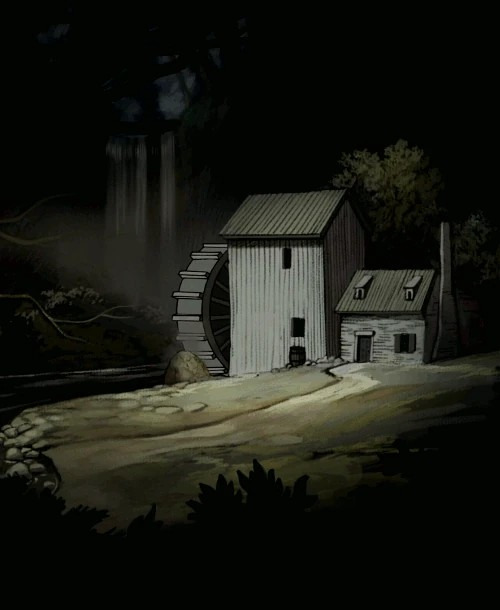
WHERE THE WOODSMAN HAS BEEN GRINDING EDELWOOD TREES INTO A DISTINCTIVELY BLACK OIL FOR THE LANTERN!
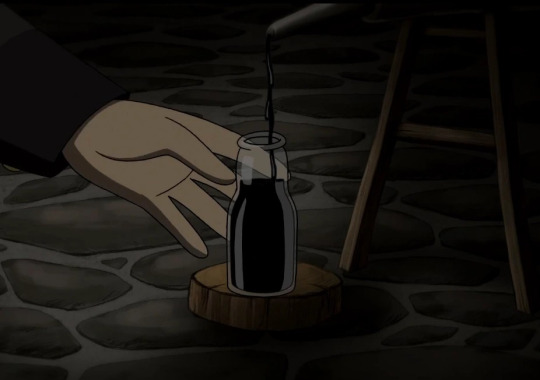
SOME OF WHICH MUST BE WASHED OFF, LEAKING, OR EVEN SPILLED OUTRIGHT INTO THE STREAM THAT POWERS THE MILL, AND THUS CONTAMINATING THE ENVIRONMENT!
It's pollution. Industrial Revolution era pollution is the reason for the black turtles distinctive color and weird effects on some people, but not others.
#over the garden wall#otgw#turtle#pollution#environment#literary analysis#critical analysis#literary theory
427 notes
·
View notes
Text
So this feels sort of obvious to me but Armand doesn’t wish to use or want any power he wants control. Specifically he wants to be in control of his sense of security, safety, stability, and attachments, his survival and identity. He controls what others are doing really only insofar as they threaten the control of any of that, cause he doesn’t really want power over them. (Except maybe Claudia, but I’d argue that is still a control thing). He will willingly forgo using or being in power for control. He manipulates and lies not for power but control. He makes grand displays of his vampire powers or strength not on the central intent of having power over people but for control. He doesn’t back down from Madeleine’s turning to have power over Louis he does it to remain in control over himself. He submits to giving up power for Louis’ power because it feels like it’s all in his control, and disobeys Louis when it’s not. He doesn’t take back power over the coven because he has more control if he does not fight it. His choice is a matter of weighing up how much control he has between the two. If the reasoned way to have control is to use power he will use it. If he doesn’t have to use power to have control, or there’s simply more control in not, he is not going to use it. Of course you will note he is simply very powerful, he has the position and means for it, and his ability to have and get so much control is a power in itself, that power is baked into having control. But he is not like Santiago, who is power hungry and wants and uses any power he can get his hands on. Or Marius who is full of himself on his power and has a sense of entitlement about it. Or even Louis who seeks and uses dominance and capital as power for a means of getting and having control. Armand is going primarily always for control as a means in itself for control, and the demand of it is a very high bar which tends to look like he wants or relishes in using power. But from all I can tell he quite hates it really, submission to power is a place of control for him, but he will use and get power if it’s the most in control means to control he has.
(This is at least as insofar as we’ve seen of him in the show. You could say Armand will have a sort of love with power but then some kind of disillusionment with it in s3, going off what I recall of tvl, that puts him back into this state of needing control being above power which would’ve also been his way of operating with Santino and Marius.)
(Added note: I should say I do believe Armand is almost always aware of his position to his power at all times, it’s not lost on him he is very powerful and can use said power if he so wanted, but it’s a question of his control if he does. He understands power and how to use it or he wouldn’t have such great ability to have and manipulate all this control. Of course he’s not perfect in this either, and I do think a strong sense of powerlessness, and total loss of control can override all his sensibility about power. Anyhow, Armand understands power extremely intimately, from all sides of it, and yet places attention not there but in having control, for the things I described above. Survival for him ranking above concerns like that.)
#armand#iwtv#interview with the vampire#amc iwtv#okay to reblog#another really quickly typed up post don’t take this as high brow analysis but more an observation#and yes as mentioned in small text this does all stem back to those assholes actually or really before that too#Armand’s life is a series of shit that is or appears to be far out of his control#and this because of all the trauma there is loaded with it losing control and autonomy is really so central to it#and it makes for all this controlling behavior manipulative behavior#And he has a specific narrative of what needs to be in control because it as well#also by “it’s’ all in his control the it’s there is submission to be told what to do is a controlled environment especially when consent#which Louis and him have with this whole thing#is involved. he feels very comfortable and secure following Louis dominance over him#and yet he still has selfhood to maintain where a no is just a no and yet also control issues#last thing I’ll disclaim is that even if this is a trauma responsive mechanism#it’s one of those ones that make you a bad person to other people and for that there are indeed consequences#and a judgment of that behavior as bad and harmful to be made. You can hold space for understanding without excusing. That's what I do here
23 notes
·
View notes
Text
“illumi loves killua, it’s just toxic/twisted.”
illumi literally views killua as his property that is his to control as he pleases. all he ever does is abuse & manipulate killua, so how about we stop calling it “love” and start calling it what it ACTUALLY is?
wanting to constantly control, manipulate, hurt, & abusive someone is NOT fucking love, pls learn that, and fast. it’s a bit concerning and incredibly disappointing that some of you don’t know that already, seriously. 💀
genuinely, get some help if you think that shit is “love”.
#it’s called POSSESSION not LOVE ffs are you dumb#you illumi sympathizers and apologists get on my fucking nerves lmao 💀#it goes way too far to the point where you guys are calling literal abuse & manipulation ‘love’ 💀#HE LITERALLY VIEWS HIS LITTLE BROTHER AS PROPERTY#WHAT ABT THAT IS LOVE???#even if it is a ‘product of their environment’ it still isn’t LOVE like pls be fucking serious#you ppl make me sick#hxh#hunter x hunter#hunterxhunter#killua#killua zoldyck#hxh killua#hxh killua zoldyck#hxh illumi#hxh illumi zoldyck#illumi#illumi zoldyck#illumi slander#i hate that bitch#meta#hxh meta#anime meta#character meta#meta analysis#character psychology#character trauma
46 notes
·
View notes
Text
Nausicaä of the Valley of the Wind: Why This is My Favourite Ghibli Movie
CW: Major high-school English teacher vibes ahead. Proceed at your own risk.
Nausicaä of the valley of wind is a story of the titular character Nausicaä and her being a bridge between the world of humans and nature to bring peace, thus fulfilling an ancient prophecy.
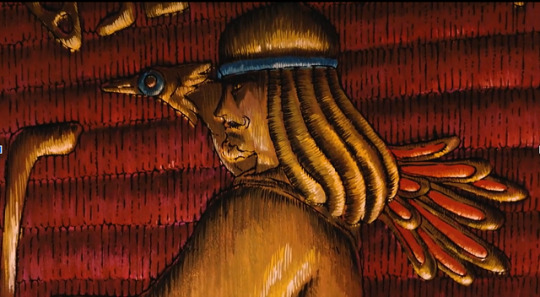
Nausicaa is the princess of the Valley of the Wind. The film begins with her walking and exploring the Sea of Decay, an area with toxic air, plants and fungal spores. She collects some spores and finds the hard molten shell of an Ohmu (gigantic blue-blooded trilobite-looking creatures), which her people use to make weapons and tools. As the name suggests, the Valley of the Wind is a civilisation that depends on and bases their culture around wind, which one can see through an abundance of windmills and gliders, including the one that Nausicaä rides. They are shown to be peaceful people who do not interfere with the politics of the warring human kingdoms or disturb nature. Nausicaä in particular is shown to have a special gift with animals—from calming Ohmus to having a pet fox-squirrel. As the existence of the kingdom depends on the sea wind that shields them from the effects of the sea of decay, there is a general reverence towards nature and its other members such as the Ohmus, that are often referred to with honorifics.
This was an element I liked: the symbolism goes deep in this film; for example, with the nature of wind—it being the very breath necessary for life is contrasted with its other face, through toxic spores in the sea of decay capable of killing anyone who inhales it.
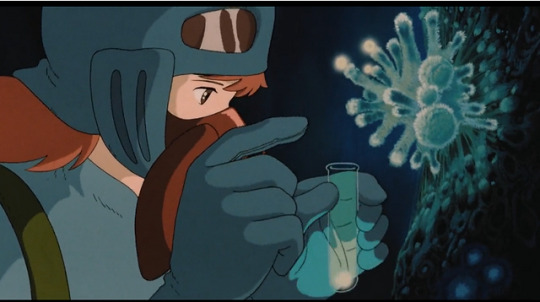
It is revealed that humans had built The Giant Men, weapons so dangerous—not unlike our atomic bombs as shown through the characteristic mushroom cloud—that the destruction caused by the war had unleashed the fury of the Ohmus, an otherwise gentle species. They wiped out entire civilisations and where they died, the Sea of Decay grew on their decomposing corpses, showing how all life is interconnected and that even in death the rage of the Ohmus, and through them the rage of nature, wouldn't subside. It is then that the viewers find out that this is not some far-off planet, but a post-apocalyptic future on earth.
New species of plants and fungi made the Sea of Decay their habitat—nature and life always find a way. It is implied that the humans lost the war referred to as the Seven days of Fire, but the truth is that it is not a war that can ever be won. Even if you win the war against nature you lose. As the story progresses, we see that the plants and fungi that Nausicaä collected from the Sea of Decay are actually trying to purify the soil and water—nature holds no grudges but only seeks balance.

The seventh of the Giant Men, a sentient atomic bomb if you will, apparently hid underground for a thousand years until the kingdom of Pejite found it for use against their enemy, the Tolmekians. They both remain oblivious to the sheer destruction that can be caused by this Giant Man and they don't care either. Despite the balance between humans and nature being a delicate one, instead of trying to rebuild together, they justify to themselves that the war is necessary for self-preservation and to put humans back on top of the food chain.
In their hubris, the Tolmekians and their princess Kushana believe that with the help of their superweapon they can destroy the Sea of Decay despite knowing that it will trigger the wrath of the Ohmus. The Giant Man however is not complete and hence, though the devastation is great, the final giant man dies and all that remains to be done is to calm the wrath of the Ohmus.
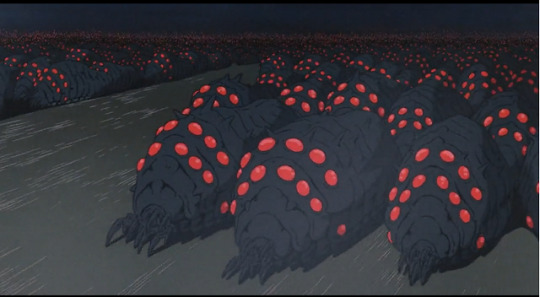
Nausicaä saves an Ohmu child who was injured by Tolmekian soldiers to lure the Ohmus into a war. She saves the baby Ohmu and sacrifices her own life to calm the sea of maddened Ohmus. The now-calm Ohmu then revive Nausicaä, symbolising the mystical healing power of nature and its ability to support and create life.
Nausicaä is an excellent protagonist, and how the trope of the chosen one is utilised is beautiful and full of symbolism. Right from the get-go, we see her being inquisitive and brave. She is willing to defend her people but not through violence. And it is made abundantly clear that her avoidance of violence is not due to any lack of strength; when she strikes down the soldiers who killed her father, rather than feeling any sense of pride (as one might expect from a character not used to strength), it sickens her. She shows understanding even towards Kushana, whose men took over her kingdom. She sincerely loves and respects animals and plants.
There was a prophecy among the people of the valley of wind that a person clad in blue over golden fields will save their kingdom and bring peace. And towards the end of the film, Nausicaä's clothes becoming blue with the blood of the baby Ohmu she saved and the golden fields being the tendrils of the Ohmus healing her is poetic to say the least.
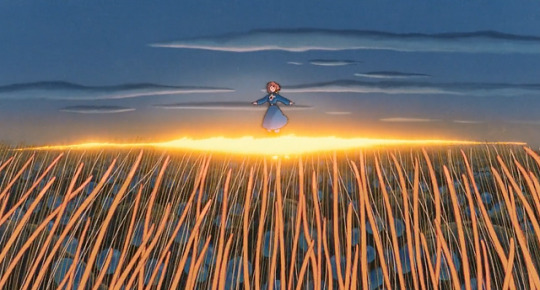
In addition to a good female protagonist, we also get a powerful female antagonist in Kushana, who starts out as a one-note expansionist ruler, but it is revealed that she lost her limbs and got severely maimed by the sea of decay, motivating her to destroy it once and for all. Proud and arrogant, sure, but she has a motive beyond just wanting power and possesses some form of a moral code. In another story she could be the protagonist bravely defending humanity against the evil, alien-esque trilobites and spores.
It was a unique and meaningful choice on Miyazaki's part to symbolise nature through the Ohmus—alien-looking giant insects—instead of something cute and fluffy. Oftentimes humans care more about the conservation of animals that they find cute (pandas over, say, Panamanian golden frogs), but an animal doesn't have to appeal to human aesthetics to be worth conserving.
Absolutely not to be missed is the breathtaking soundtrack by Hisaishi. There are symphonies, techno music, sitar-like instruments and a child's humming, all elevating every scene to give a moving experience.
Ultimately it is an ambitious story that aims to deal with themes of coexisting with nature, the futility and dangers of war, and of how innocent children who should live carefree lives are dragged into it and made heroes. This film is often categorised as falling into the genre of Solarpunk: a literary and artistic movement that centres around building a sustainable future interconnected with nature and community. Although this film does depict violence and wars, it ultimately shows a peaceful future is possible.
Truly a masterpiece. 9/10.
#analysis#culture#short essays#media#anime#fictional characters#film#ghiblicore#studio ghibli#musings#movies#solarpunk#climate change#nuclear#environmental issues#environment#miyazaki#feminism#review#character analysis#nausicaa#animanga#animals
239 notes
·
View notes
Text
One of the most interesting contrasts to me between Lego parodies and Lego shows you're supposed to take semi-seriously is generally Lego parodies acknowledge that they're Legos. Lego Star Wars acknowledges that everyone's Lego; I vividly remember a scene where Luke gets his hand blasted off, freaks out briefly, then remembers he's a Lego minifigure and just puts his hand back on, for example.
With shows like Chima and Ninjago, it's basically just a story being told using Lego minifigures as a medium. There's no indication in Ninjago (or Chima that I remember) that the characters are actually Lego and Lego isn't just being used as an artistic medium, so to speak. There are of course exceptions to this (the Lego Movies being a good example of this; The Lego Ninjago Movie is a parody of Ninjago for example, which is one reason I find the complaints against it dumb lol) but generally, Lego seems to utilize properties they have a license to use for parody and properties they own to tell more serious stories with Lego characters being used as an artistic medium.
I 100% think it has to do with genre too. Lego parodies of properties they have a license to use are generally the goofy silly shenanigans normally associated with parody. They're something you can knock out in 20 minutes if you need a laugh. They don't require much suspension of disbelief because they're made to feel like you're watching little Lego people goof off.
Shows that are original Lego properties, such as Ninjago and Chima, still have comedy, because they're targeted at kids. However, you also still have an engaging storyline spanning seasons instead of shorts. They require more suspension of disbelief because Lego minifigures are being used as a medium through which to tell a story, there's no indication that the Lego people we see on screen are Lego minifigures in the universe the story takes place in.
Shows featuring properties that Lego has a license to use have a completely different vibe than properties Lego owns. It's really interesting to me and I like that there's a disconnect between the stuff Lego uses to make silly shenanigans type shows and the stuff Lego uses for more serious storylines because it allows you to know vaguely what to expect going into something (although Ninjago gets seriously dark at times and I will always be surprised by how dark it gets despite having watched the entire series and all the episodes currently released for Dragons Rising).
#ninjago#lego ninjago#lego#lego shows#analysis#on some level at least#anyway yeah lego shows are really interesting to me#i also think it's worth mentioning that most lego parody stuff uses actual lego pieces to create environments#the only thing lego in lego-owned properties is the characters
40 notes
·
View notes
Text
what was komaeda like during his school years at hpa?
bc there are contradicting stuff in the series
in sdr2, it was because of the stress of the killing game that caused him to be active in causing mayhem, like convincing ppl to kill in ch1 and 2
in island mode, he's pretty harmless, he just says some out of pocket stuff from time to time
but in makoto's secret file, komaeda was "constantly getting into trouble, so much so that it concerned the headmaster"
and idk if he's just being weird, or he just straight up doing criminal stuff in hpa
(if the former was true, i find it ao funny bc in the short story, the board of directors, four old men, shuddered at the mere thought of this guy)
returning back to topic, i wonder what kind of environment hpa actually is. bc it is described as the most peaceful and hopeful time before junko came along. we never actually saw what its actually like inside
if its a really stressful environment, almost matching the stress of the killing games, then it would make sense that komaeda would start shit up; otherwise it doesnt
in the dr3 anime, it really seems like its a very laid back school, where the stress only came from the examinations that come from time to time. other than that, the students just do their own thing in the meantime, i dont think they even hold classes
well, i dont think the dr3 anime is canon, cuz its not written by the dr team nor kodaka
#if hpa was a stressful environment plus the academny does shady deals and connections and corruption#then junko doesnt need to do anything big lol#i can see junko being a cult leader of sorts#danganronpa#danganronpa 2#sdr2#danganronpa 3#dr3 anime#nagito komaeda#komaeda nagito#rambles#dr analysis#i guess#i really do wonder what the education system is like in hpa
27 notes
·
View notes
Text
An Analysis of Haruka’s MVs: Distance and Disability
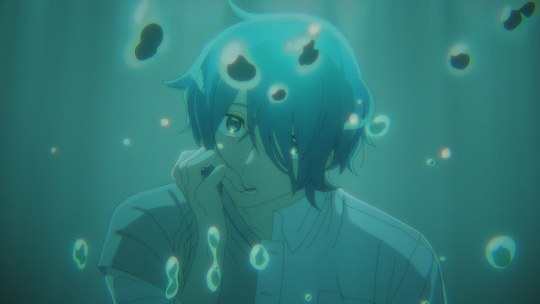
Hello! I’ve recently fallen down the rabbit hole that is Milgram and I have been itching to make some completely normal and sane analysis posts. My silly alternate title for this was gonna be “Things About Haruka’s MVs That Just Make Sense: A Hyperfixation-fuelled Analysis”, because honestly my autistic brain has been having a field day over here.
I am in awe with just about every single music video in this project; the animation is incredible and each one packs so much carefully laid out information. But I have been rotating Haruka’s in my head constantly since I first watched them, and I have a lot of Thoughts. Not about whether he’s guilty or innocent/forgiven or unforgiven. Not about whether or not I can justify his murders. Just some straight up imagery and symbolism analysis, through the lens of disability.
Haruka’s disability has not been specified, but I am confident we can at least say he is neurodivergent. I feel like the cultural differences in names for several things e.g. ‘learning disability’ vs ‘learning difficulty’ will just invite unnecessary drama, and is a little pedantic. What does matter here is that Haruka's experience as a disabled person is heavily intertwined within his story and his motives.
So, without further ado... let’s get into this!
Trigger warnings/TW: I will be discussing ableism, eugenics and harm towards disabled people. Everything else will be related to the music videos ‘Weakness’ and ‘All Knowing and All Agony’, so any triggering content within them may also be mentioned. Read at your own discretion and stay safe!
Disability: some brief (important) historical context
It is only within the last few decades that those who are disabled have been ‘seen’ for the first time. A modern society is (ideally) expected to be built to include and accommodate for disability, and to acknowledge disabled people’s existence. But for many countries (even the ones making steps outlined above) this is still not the case. For a very, very long time, globally, that has not been the case.
For most disabled people, society makes it very clear that they are a burden to it and are better off not existing.
I’m going to make this section as succinct as possible because...it’s heavy stuff. But it’s important, and I want you all to get the gist of what I’m saying. The weight of it.
Let’s highlight a piece of history regarding IQ and eugenics, surrounding the publication and subsequent worldwide reception of ‘The Kallikak Family: A Study in the Heredity of Feeble-mindedness’ by Henry Herbert Goddard in 1913:
“In 1927, it was used as evidence in the case of Buck v. Bell, which culminated in a Supreme Court ruling that the involuntary sterilization of ‘mentally defective’ persons was not unconstitutional in the United States. By 1938, thirty-three US states had passed laws allowing for the forced sterilization of women with learning disabilities and twenty-nine had made sterilization compulsory for people who were thought to have genetic conditions. Many European countries followed suit: Denmark in 1929, then Norway in 1934, and after that Sweden, Finland, Estonia, Iceland, Czechoslovakia, Yugoslavia, Latvia, Hungary and Turkey.”
— Limburg, J. (2021) Letters To My Weird Sisters: On Autism and Feminism, p. 126
This history of a ‘sterilization law’ includes Japan, who between 1948 and 1996 enacted the Eugenics Protection Law which “authorised the sterilization of people with intellectual disabilities, mental illnesses or hereditary disorders.” According to the government, about 25,000 were sterilized.
SO. It’s important to bring this up. To establish how much disabled people are not wanted, just from their governments. Let alone society. To this day, disabled people are hidden away from the public by families that are ashamed of their existence.
Japanese culture values collectivism, and maintaining the harmony of a group...to the extent of excluding those that don’t fit into the mould. That are different.
The question is: where do they go? The ones that are publicly rejected?
Haruka and The Curious Case of Distant Waters
Okay that’s enough of the heavy real-world stuff! Time to delve into some...*checks notes*...heavy fictional stuff. Fun!
Haruka’s MVs prominently display themes of distance and separation through the motif of water, specifically being submerged underwater.
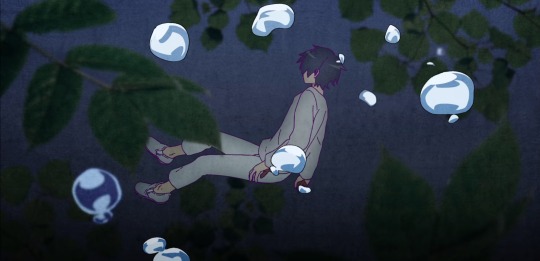
The name Haruka reinforces this concept as the specific kanji used (遥) translates to ‘distant’, ‘remote’ or ‘far away’. As there are many, many kanji choices for the name (including but not limited to: ocean/sea, eternity/permeance, clear/distinct/obvious, and spring/growth/cherry blossom) it feels like a particularly cruel and intentional choice to go with that one.
Through the exploration of this motif, we can see the extent in which Otherness/the state of being ‘Other’ drives Haruka to great lengths to close the distance and escape it.
What I noticed throughout both MVs (particularly AK&AA but note the beginning scene of Weakness), is that whenever Haruka looks at himself in a reflective surface (e.g. the vanity mirror, the fish tank), water either begins to rise and overwhelms him, or is already there and he appears submerged:
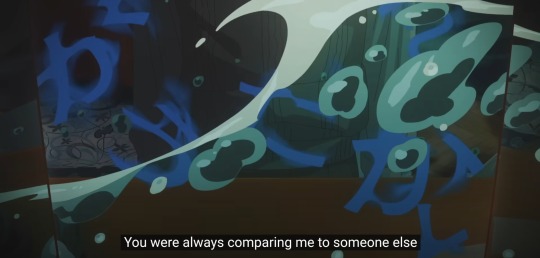
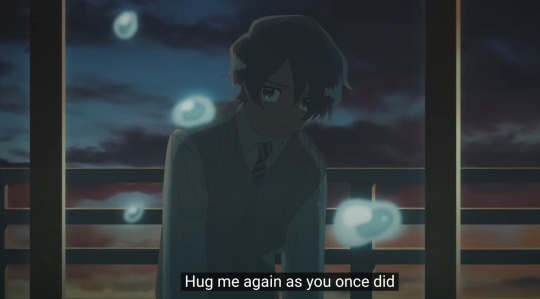
I think this is the “All-Knowing” part of AK&AA. He knows he’s different, and he knows there’s a huge ocean between him and his peers, his family, everyone. A disconnect when trying to listen and understand, but also when trying to be understood by others and listened to himself.
You know when you submerge your head in water, and your hearing gets all muffled and incomprehensible? And have you ever tried speaking underwater? You can’t, because if you open your mouth you’ll drown. It’ll just come out as bubbles rising to the surface.
I also think the bubbles symbolise rising tension, between what he wants and what he currently has. Bubbles are everywhere in these MVs, even in places where they shouldn’t logically be? Such as this scene, following the line “don’t wipe me out, don’t wipe me out”:

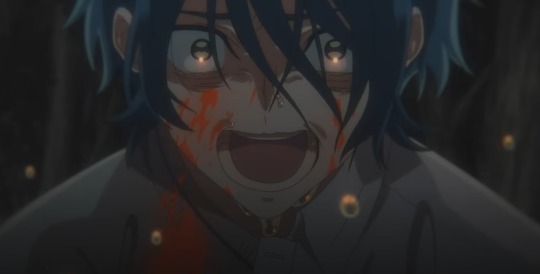
Immediately pans up to Haruka gasping for breath, droplets of water rising from...somewhere. For about a split second, and they’re gone.
This boy is really going through it. I’m getting an ‘emerging from the ocean before I drown’ vibe from this one folks. When the line that follows this scene is “I can’t stop, I can’t stop”, what I’m REALLY hearing is “I can’t stop (killing) or I’ll drown”. This is his lifeboat, pulling him out from the depths of being neglected and hidden away, into the spotlight.
Some interesting images from Weakness in relation to that (of spotlights):


Anyways, onto the next point:
Blue to Orange: Water to...Nectar?
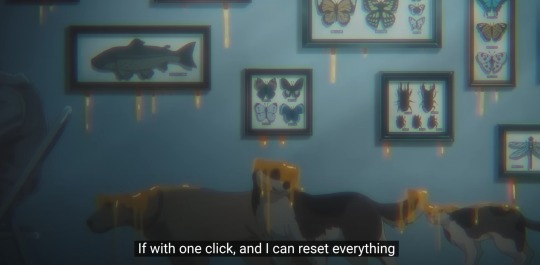
So, the orange liquid. It’s clearly representing blood, but I don’t think this is just a “danganronpa pink blood” situation of censoring/getting this video onto youtube without restrictions.
I think it’s most likely honey, specifically nectar.
The etymology of the word nectar shows its compounds translate to “death” and “overcoming”. Nectar is also called the drink of the gods, so it would make sense for it to be a ‘death-defeating’, immortalizing liquid.
For Haruka’s victims to contain nectar is very interesting. It reinforces that necessity to kill, to take the life of another, to sustain himself. To overcome the ‘living death’ he is experiencing by being hidden away from society.
This is his means of escape from drowning.
However, as we all know, things don’t turn out great for him. By the end of AK&AA Haruka is rejected once again by his mother, after which the door is shut (the light with it is gone too) and we’re met with this imagery:
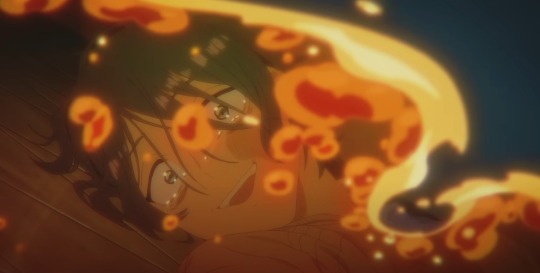

The nectar floods the room, engulfing him much like the water from earlier.
There are many things we could take from this. One being that the nectar-gathering/killing-spree has clouded his vision; it’s so sweet, so sickly sweet and he’s addicted to the taste of attention, even if it’s very bad attention.
Who else has honey imagery in their MV again?
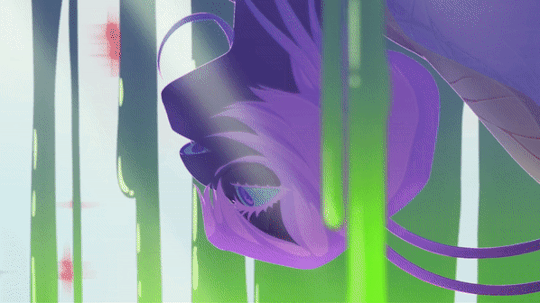
Oh, right.
Anyway, the nectar/honey situation could also be representing submerging into an even further level of distance. All that murder is gonna push people away, despite his motive being to close the gap between him and normal people. The 'ocean’ has lost clarity and become a maddening, delusional substance. After all, there is a type of honey literally called ‘mad honey’ known for its medicinal and hallucinogenic properties.
That’s enough about honey, though. Let’s move onto less unfortunate... oh, sorry, what was that? *checks notes*...Ah, yes. I meant to say, let’s move onto even more unfortunate symbolism:
The Necklace

So, this necklace. Haruka steals it from his mother’s belongings, and is his only material, physical connection to her. It is taken on the declaration of “making (her) love me again” and getting her attention once more, now he is no longer a child but a teenager closer to adulthood (at least, that’s what I consider the ‘shirt with a vest sweater and tie’ to represent. child him = the blue polo, teenager him = this one, adult him = an amalgamation of his teenager clothes).
I wasn’t sure if this was an opal or pearl/mother of pearl, but I’m leaning towards opal from the other depiction of it in Weakness:
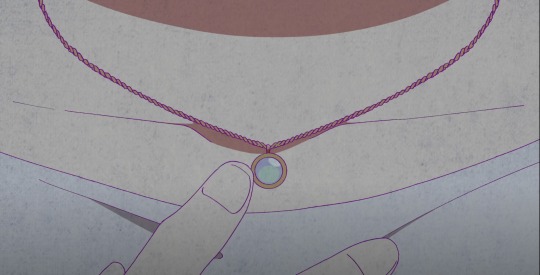
Opals are fun because they can symbolise both good luck and bad luck, usually to do with whether it’s your birthstone. There’s something to be said of Haruka’s belief in his ‘misfortune’ and the superstition surrounding these gemstones.
But they are even more interesting for the powers they supposedly have; in medieval times the opal was considered the ‘patron of thieves’ for their ability to grant the wearer invisibility.
There is a deliciously sad irony to Haruka’s theft with that titbit of information.
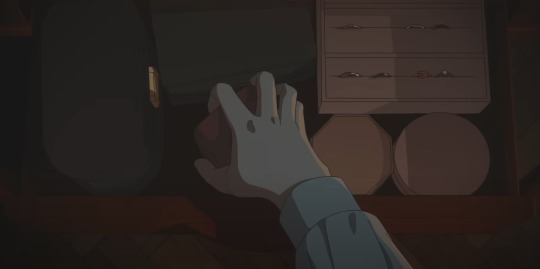
Now, if this isn’t an opal, and it’s a pearl/mother of pearl there’s still some fun interpretation to be had! A little less sad, even. Pearls invoke strong imagery of the sea, of purity, and of a connection to the maternal. If this is the last thing he has relating to his mother, I can see this necklace representing a lifeline when he’s deep in the ocean. A reminder of why he’s doing all of this killing, and who it’s for.
His mother’s attention (or the idea of having a mother at all, any mother) is his driving force in life.
Speaking of that...
So We Really Need To Talk About That Fish Tank: AKA, Why Haruka’s Mom Wins ‘The Worst Parent of The Year’ Award
This fucking fish tank.
Okay, I’m gonna start by saying: I don’t think this is reading too far into things. When it takes an animation team months, sometimes years to create a 3-5 minute music video, and one as detailed as this...you don’t just wing it. There are storyboards, there are key frames and there are choices made down to the smallest of details.
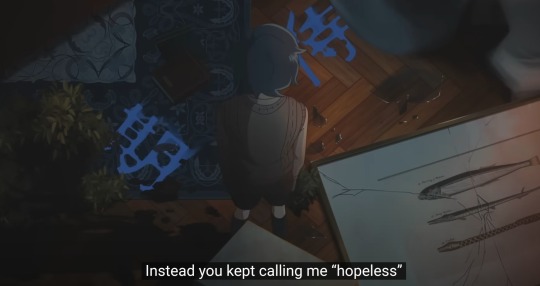
From the sheer volume of animal/insect/fish décor that resides in the Sakurai household, you bet I’m gonna pay attention to what type of fish are in that fish tank.

For one thing, they live in saltwater. This is a marine tank, aka the harder choice of aquarium to have. I mean, way, WAY harder. For the experienced only.
These fish right here? One is a clownfish, and the other is a yellow boxfish.
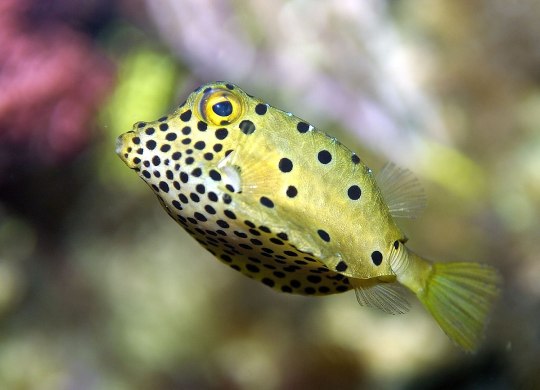
Boxfish are a nightmare to keep alive. This article goes into more detail than I will, but all you need to know is: if there was ever a fish out of all the fish you could possibly want in your tank, this is the one to avoid like the plague.
They release deadly toxins when stressed, as a survival instinct. Boom. All your fish are dead. They need to eat a shit ton of food, but are notoriously clumsy swimmers and slow eaters. Boom. Starving, stressed out boxfish. Boxfish either dies from starvation or dies from stress and toxins.
For Haruka’s mom to have not just one of these fuckers, but a tank consisting ONLY OF MULTIPLE BOXFISH AND CLOWNFISH...
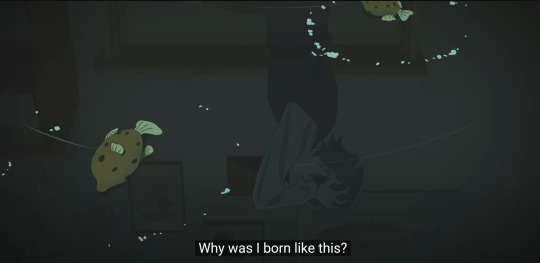
This is a high-maintenance tank. And it shows how much time and effort, how much care she puts into the things she loves.
How neglectful she is as a parent of a disabled child in contrast.
There’s something about the last scene between Haruka and his mother that reinforces this for me:
Haruka’s relationship with animals and himself: AKA, “why don’t I just become the damn fish tank?”
Let me backpedal a little bit. This subheading will make sense in a minute.
So, like I said earlier we have a lot of décor in this house relating to insects and fish. We also have a lot of pets. Both living and dead, taxidermized creatures in one household, proudly on display.
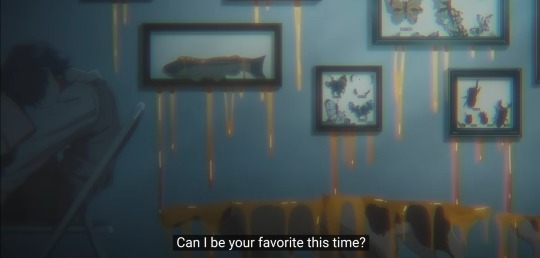
I think this may have created some confusion for Haruka regarding the value of animals being alive or dead, as in his perspective his mother values both equally. The fish in a tank may be full of alive creatures, but they’re still on display as if it’s artwork. Isn’t breaking the glass of a framed picture of a fish equal to breaking the glass of a tank with a ‘picture of living fish’?
(This isn’t to say Haruka is clueless to the impact of his actions, nor to justify any harm to animals. I just find the train of thought to be intriguing.)
So when considering these ‘objects’ are proud trophies of his work:
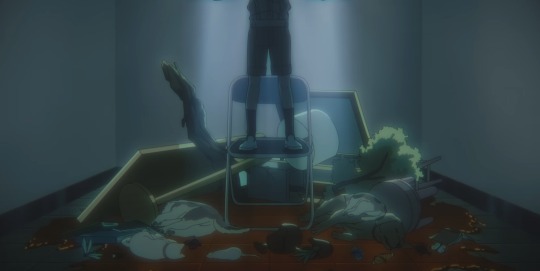
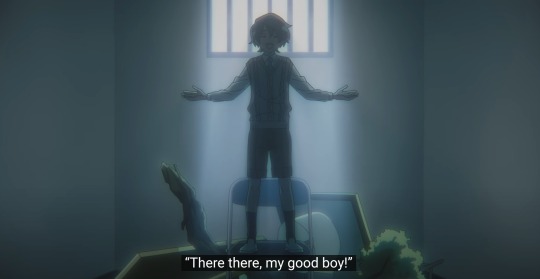
This is a carefully arranged display, which by the way, doesn’t contain a single fish. In fact the only piece of that moment visible here is the...large piece of driftwood? Okay. Keep that in mind.
We proceed into Haruka’s mother opening the door and seeing her son, for the first time in any of the MVs. Note the way they composed this shot:

I’m obsessed with this scene. The blue eye framing Haruka, with a literal fishbowl effect on him...
He is the goddamn fish in the aquarium now. His mother’s full attention is on him and him alone, with only the dead animals, the books, the lamp and the driftwood as window dressing to this wonderful display.
Doesn’t it just scream “Look at me! Look at what I did, mom!” to you?
That blue spotlight is on him once more. He is not just drifting deeper into an endless ocean, but contained in a vessel to be stared at.
One Last Observation
I didn’t know where to fit this in but I think the end feels appropriate.
His clothing here:
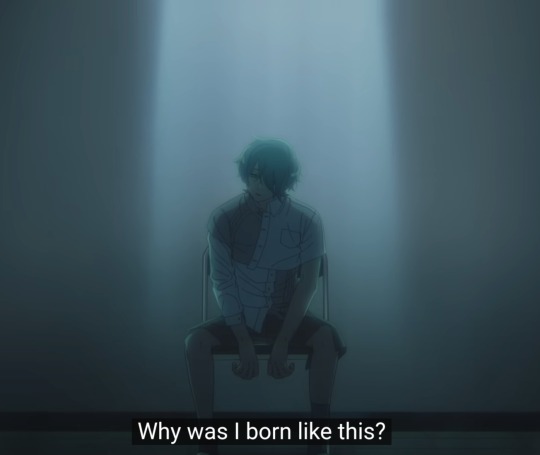
Is a frankenstein-esque mash up of clothes from his younger years. He wears this throughout AK&AA, and as I mentioned before it signifies him as an adult. However, I should clarify what I mean here as Haruka says “he thinks he’s 17″ and “doesn’t care about his age”. So... not an adult, but on the cusp of adulthood.
But I think he actually does care about his age, and quite a lot too.
This outfit feels symbolic of refusing to let go of the past, and of himself as a child. He’s literally grown out of his clothing, but he still clings onto it. He’s attached to the past because it not only contains his happiest moments, but the change from being loved to becoming neglected.
As a disabled person, you’re often treated with a lot more forgiveness when you’re younger. That is to say, some people don’t realise that children with disabilities grow up into adults with disabilities. There is a point where even support from medical and social services drops off like a cliff edge once you turn 18.
The ill-fitting clothing in this context becomes more than a reflection on Haruka’s feelings, and extends to reflecting society’s feelings on disabled adults ‘refusing to grow up’.
I don’t blame Haruka for holding onto his childhood like this. He’ll be even less publicly visible and seen once he is no longer a pitiful child, but a ‘weird’ adult in ill-fitting, children’s clothes.
#milgram#haruka sakurai#analysis#weakness#all-knowing and all-agony#symbolism#disability#*drops this onto the fandom like a ton of bricks* hi i'm new here pleasure to meet u#oh man I finally finished it... this is a very (and I mean a VERY) long post asdfghjkl#I'm pretty happy with how it turned out though! I got most of the things I wanted to say and point out down#believe it or not there was actually MORE I could've said but I think tumblr may have crashed on me if I did that lmao#particularly to do with Weakness as I focused more on AK&AA here. but anyways#I love how morally grey everyone is in this series! It makes for some really fun analysis!#it's so so nice seeing a disabled character in such a position too and not just 'is a cinnamon roll' or 'the devil reincarnate' yknow#I debated leaving in the real-world history stuff but I think it sets the tone of my analysis pretty well and shows the importance of--#--haruka's disability not as a justification of his actions but as a vital backdrop to his environment and struggles
274 notes
·
View notes
Text
the twine is a metaphor for the writers not planning for ed and stede to be together/intertwined (or maybe not this fast), but they 'panicked' and added a flourish(ing relationship) pretty quickly "it works, it does, it actually made it" it actually made the show

the panic was presumably the fact that they definitely won't get s3
#ofmd#our flag means death#edward teach#blackbeard#tv show analysis#meta#stede bonnet#analysis#scene analysis#theyre the plant#developing in a healthy environment that suits them and developing beautifully
39 notes
·
View notes
Text
.
See the thing is. I know I'm good at writing. Like I have my weak areas or things I need to improve in, but it's not a skill I otherwise spend a lot of time feeling insecure about because a) if I don't believe in my writing literally who will b) if I want to publish my writing I ought to at least feel a resting level of good about it because editors and agents likely will not be cradling my face like a prize cat and telling me how talented I am while asking for their edits c) I've always had an audience for my writing even at its worst– I started sharing my original works online when I was around 16 & that really helped sell to me the idea of 'there will always be someone out there who likes what you do' d) untalented men never think this hard about the quality of their works and they always end up published anyway and e) I don't have many other thoroughly developed skills so why not have one I feel good about. Having said this. Awkward feeling to realize you're one of the authorial weak links in your postgraduate creative writing degree's social circle
#part of the issue is definitely also like. i am good at what i do! its just that im the only one doing it#40 people in my fuckass degree and im the only one who writes fantasy fiction. we had one more girl but she did romance & dropped out#(to be an agent) (this isnt a sad story)#but yeah no im mostly surrounded by very talented poets and screenwriters. which makes my works seem a little. frivolous. in comparison#and my friends especially are so fucking talented it makes me ill. and they engage politely with me about my writing but its also#superficial and i cant blame them because its simply not what they write/what theyre interested in! i feel the same about poetry#but my friend actually seemed surprised a while ago when i mentioned a thing id been writing and i joked that it looked like she was#surprised i could have good ideas and she didnt answer. and like. man.#i am a good writer! i fucking know im a good writer but im a good FANTASY writer and these people are. different writers and theyre good an#im floundering in this environment next to them and theres something not as like.. artistic in what i do its so fucking embarrassing#and they also display just such a lack of curiosity as to others' writing like.. they wont check the moodle forum to read what the others i#our module have uploaded for each assignment?? like arent you even just CURIOUS? but now im also just wondering if theyre like 🤞 this#with each other in a way that excludes me and my stupid flop ass fiction. i dont know. its just so silly. everyone always talks about#finding community in writing groups & degrees & such and that is exactly the last and most isolating place ive ever been insofar as my#writing goes. like at least way back in high school no one cared in general. here people do care. just not about what i can bring to the#table. although again i really dont know if this is a larger scale lack of curiosity/involvement in others works so i digress.#notnow#tbd#sorry this is a very priveleged complaint to have i AM deeply enjoying my degree and ik im so lucky to get to go where i attend. i just#occasionally feel sad. and knowing i failed my last assignment (which WAS fiction) (one chance to prove myself! cute) isnt helping much#if the poetrypeople are better at me even in the thing im meant to be good at. baby we're about to enter the mental health meat grinder.#but we stay silly. i think i just need to find people online etc to talk to about writing again like i did at 17.#just full insanity paragraph analysis. that was fun. i enjoyed that.
16 notes
·
View notes
Note
thanks for being unabashedly shyan. not to be accusatory but some people out there need to loosen up
I get that because it also took me a while to be like "can I post rpf on my rpf sideblog that I created for posting rpf" and the answer is yes. (you can notice that not all posts are tagged shyan mostly because I don't think they're shippy enough to be that way. And then I realized that this is the lens I want to view their content through and here we are).
And then watcher turned out to make other fun shows that I enjoy and I couldn't stop myself from writing long posts about so that's what this blog is now I guess.
I get that rpf is ~controversial~ or not everyone's cup of tea and I'm fine with that, that's what the block button is for feel free to use it. I tend to do that for reasons that are more superficial than that.
But also yeah it all boils down to "making the content you want to see" and for me that's 2012 tumblr style analyzing the way they look at each other and imagining a gay reason for that. It's really not that deep at the end of the day like I don't think they should divorce their wives about it or anything, it's more like shipping a thing because it compels you not because you want to see it happen for realsies.
Also it's really hard to come up with a hetsplanation for what they're saying and I think at the end of the day that's how I enjoy participating in fandom and it is what makes me happy so I'm gonna do that.
#replies#Idk maybe it is me being in my 30s and not caring anymore#and the other wolf is 'my shyan analysies are wasted on closed discord servers I need to put my words somewhere else'#anyway I do appreciate that veil of them not using the ship for content like 99% of youtubers finding out about rpf and reading fics aloud#in that way this is really just people staying in their place and knowing to mind their business#I also think it's important for at least one person to be like 'hey if you're into shyan then I DON'T want to kill you with hammers'#because this makes for better fandom environment in the long run
13 notes
·
View notes